|
Books Should Be Free Loyal Books Free Public Domain Audiobooks & eBook Downloads |
|
|
Books Should Be Free Loyal Books Free Public Domain Audiobooks & eBook Downloads |
|
Top Authors |
|---|
|
Book type:
Sort by:
|
By: Sax Rohmer (1883-1959) | |
|---|---|
 Fire-Tongue
Fire-Tongue
| |
 The Green Eyes of Bâst
The Green Eyes of Bâst
| |
 The Sins of Séverac Bablon
The Sins of Séverac Bablon
| |
 The Orchard of Tears
The Orchard of Tears
| |
By: Émile Zola (1840-1902) | |
|---|---|
 L'Assommoir
L'Assommoir
Émile François Zola (French pronunciation: [emil zɔˈla]) (2 April 1840 – 29 September 1902) was an influential French writer, the most important exemplar of the literary school of naturalism. More than half of Zola’s novels were part of a set of twenty novels about a family under the Second Empire collectively known as Les Rougon-Macquart. L’Assommoir (1877) is the seventh novel in the series. Usually considered one of Zola’s masterpieces, the novel—a harsh and uncompromising study of alcoholism and poverty in the working-class districts of Paris—was a huge commercial success and established Zola’s fame and reputation throughout France and the world. | |
 Therese Raquin
Therese Raquin
An unsatisfied wife kills her weak husband in order to carry on a sordid affair with another man. However, her selfish plans are spoiled when her husband continues to haunt her. This is often said to be Zola's first great novel. | |
 The Flood, trans. by an unknown translator
The Flood, trans. by an unknown translator
A well-to-do French farm family is destroyed by a flood. The story, thrilling to the very end, is told from the point of view of the family’s 70-year-old patriarch. The story speaks of the helplessness of mankind in the face of the forces of nature. | |
 English Translations Of Works Of Emile Zola
English Translations Of Works Of Emile Zola
| |
 The Fat and the Thin
The Fat and the Thin
| |
 Four Short Stories By Emile Zola
Four Short Stories By Emile Zola
| |
 The Downfall
The Downfall
| |
 The Fortune of the Rougons
The Fortune of the Rougons
| |
 L'Assommoir
L'Assommoir
| |
 Doctor Pascal
Doctor Pascal
| |
 Abbe Mouret's Transgression
Abbe Mouret's Transgression
| |
 The Dream
The Dream
| |
 A Love Episode
A Love Episode
| |
 The Three Cities Trilogy, Complete Lourdes, Rome and Paris
The Three Cities Trilogy, Complete Lourdes, Rome and Paris
| |
 The Three Cities Trilogy: Lourdes
The Three Cities Trilogy: Lourdes
| |
 The Three Cities Trilogy: Rome
The Three Cities Trilogy: Rome
| |
 The Three Cities Trilogy: Paris
The Three Cities Trilogy: Paris
| |
 Fruitfulness
Fruitfulness
| |
 The Fête At Coqueville 1907
The Fête At Coqueville 1907
| |
By: Aphra Behn (1640-1689) | |
|---|---|
 Rover (Part One)
Rover (Part One)
| |
 Love-Letters Between a Nobleman and His Sister
Love-Letters Between a Nobleman and His Sister
| |
By: John Foxe (1516-1587) | |
|---|---|
 Fox's Book of Martyrs Or A History of the Lives, Sufferings, and Triumphant Deaths of the Primitive Protestant Martyrs
Fox's Book of Martyrs Or A History of the Lives, Sufferings, and Triumphant Deaths of the Primitive Protestant Martyrs
| |
By: Edmondo De Amicis (1846-1908) | |
|---|---|
 Cuore (Heart) An Italian Schoolboy's Journal
Cuore (Heart) An Italian Schoolboy's Journal
| |
 Holland, v. 1 (of 2)
Holland, v. 1 (of 2)
| |
By: Philip Jose Farmer (1918-2009) | |
|---|---|
 Rastignac The Devil
Rastignac The Devil
French colonists on a planet ruled by reptiles and amphibians are forced to wear living “skins” that subdue aggression and enforce vegetarianism. As children, Rastignac and his reptile friend Mapfarity force themselves to become carnivores and begin a protein fueled journey that causes Rastignac to develop a Philosophy of Violence. When a spaceship from Earth crashes in the ocean, Rastignac and company must put their philosophy to the test. - Rastignac The Devil was first published in the May 1954 issue of Fantastic Universe Magazine. | |
By: Frank Stockton (1834-1902) | |
|---|---|
 Rudder Grange
Rudder Grange
This book presents a number of short, comedic sketches of a country life in middle America in the late 1800s. The hilarious twists and turns endear our adorable, naive married couple to the reader; and the orphan servant Pomona – dear, odd, funny Pomona! – is the focus of several of the stories. Imagine a honeymoon in a lunatic asylum, and you’ve got Rudder Grange! | |
 Pomona's Travels
Pomona's Travels
Pomona and Jone of Rudder Grange fame travel to England and Scotland. Along the way, Pomona tangles with wild pigs, haymaking, hotels great and small, Pullman cars, comparison-makers, and a Duchess. She makes two matches and – in her usual, unorthodox way – stag hunts and attends a knighting. Pomona is as hilarious as ever, if a bit more rounded off on the edges. | |
By: Joseph Sheridan LeFanu (1814-1873) | |
|---|---|
 Carmilla
Carmilla
Published in 1872, Carmilla is an early work in the vampire literature genre and is incidentally one of the most influential of its type. The gothic novella accounts the tale of Laura, a young woman who becomes susceptible to the friendship and seductive charms of the mysterious Carmilla. A gripping tale of coincidence, mystery, compulsion, dark romance, and deception, Le Fanu’s classic is regarded as having paved the way for modern takes on vampires. Narrated by Laura, the novel opens with a recount of her childhood, as she depicts growing up in a beautiful, yet solitary castle encompassed by a forest in Styria, Austria... | |
By: Clarence Edwords (b. 1856) | |
|---|---|
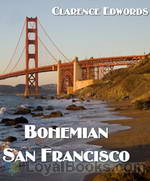 Bohemian San Francisco
Bohemian San Francisco
While describing his dining experiences throughout “Bohemian San Francisco,” Clarence Edwords paints an historic panorama of California cuisine with all its cosmopolitan influences. Best of all, he offers tantalizing recipes culled from conversations with the master chefs of 1914 in “The City by the Bay.” | |
By: C. S. Lewis (1898-1963) | |
|---|---|
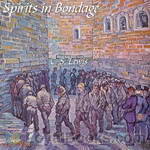 Spirits in Bondage: a cycle of lyrics
Spirits in Bondage: a cycle of lyrics
First published in 1919 under his pseudonym Clive Hamilton, Spirits in Bondage, is also the first published book by the notorious novelist C.S. Lewis. This early piece of work represents Lewis’ youth, as it was written at a time when the author had just returned from his military service in the First World War. In addition it differentiates itself from his other works, not just in terms of style, but also in themes due to his agnostic stand at the time. Written in the form of poetry, the piece is divided into three sections of poetry, each intended to be read in chronological order to gain complete access to its themes and ideas... | |
By: Booth Tarkington | |
|---|---|
 Alice Adams
Alice Adams
A Pulitzer Prize-winning novel, Alice Adams chronicles the attempts of a lower middle class American midwestern family at the turn of the 20th century to climb the social ladder. The eponymous heroine is at the heart of the story, a young woman who wants a better place in society and a better life. As Gerard Previn Meyer has stated, “Apart from being the contribution to social history its author conceived it to be, [Alice Adams] is something more, that something being what has attracted to it so large a public: its portrait of a (despite her faults) ‘lovable girl’.” | |
 Seventeen
Seventeen
A Tale of Youth and Summer Time and the Baxter Family Especially William | |
 Gentle Julia
Gentle Julia
Penrod for girls in the form of Florence, the bratty younger cousin of luminous Julia Atwater, enlivens this romantic comedy set in Tarkington's Indiana of the early 20th Century. | |
 Penrod
Penrod
Join Penrod Schofield and his wistful dog Duke, in a hilarious romp through turn of the century Indianapolis, chronicling his life, loves, and mostly the trouble he gets into. | |
 The Magnificent Ambersons
The Magnificent Ambersons
The Magnificent Ambersons is a 1918 novel by Booth Tarkington which won the 1919 Pulitzer Prize. It was the second novel in the Growth trilogy, which included The Turmoil (1915) and The Midlander (1923, retitled National Avenue in 1927). In 1942 Orson Welles directed a film version, also titled The Magnificent Ambersons. | |
 Penrod and Sam
Penrod and Sam
Follow more of the hilarious life of the boy Penrod Schofield, his friends Sam Williams, Herman, Verman, Georgie, Maurice, and the love of his life, Marjorie Jones. | |
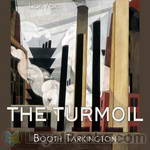 The Turmoil
The Turmoil
The Turmoil is the first novel in the ‘Growth’ trilogy, which also includes The Magnificent Ambersons (1918) and The Midlander (1923, retitled National Avenue in 1927). In 1942 Orson Welles directed a film version based on volume 2, also titled “The Magnificent Ambersons.” The trilogy traces the growth of the United States through the declining fortunes of three generations of the aristocratic Amberson family in a fictional Mid-Western town, between the end of the Civil War and the early part of the 20th century, a period of rapid industrialization and socio-economic change in America... | |
 The Gentleman from Indiana
The Gentleman from Indiana
| |
 The Man from Home
The Man from Home
| |
 Harlequin and Columbine
Harlequin and Columbine
| |
 The Two Vanrevels
The Two Vanrevels
| |
 His Own People
His Own People
| |
 In the Arena Stories of Political Life
In the Arena Stories of Political Life
| |
 The Gibson Upright
The Gibson Upright
| |
 Ramsey Milholland
Ramsey Milholland
| |
By: Gideon Wurdz (b. 1875) | |
|---|---|
 The Foolish Dictionary
The Foolish Dictionary
“The Foolish Dictionary” was written by “Gideon Wurdz” and was published in 1904. According to the beginning of the book, it is “An exhausting work of reference to un-certain English words, their origin, meaning, legitimate and illegitimate use…” This a a short but amusing dictionary which “redefines” words in some interesting ways. Funny and sometimes bizarre observations are sprinkled throughout. In keeping with the policy to read, rather than attempt to rewrite, books – even those with offensive content – nothing has been omitted... | |
By: William Shuler Harris (b. 1865) | |
|---|---|
 Life in a Thousand Worlds
Life in a Thousand Worlds
A jolly romp, which could be perhaps be described as Gulliver’s Travels Through Our Solar System and Beyond, as written by a great admirer of C. S. Lewis, on a rainy Sunday afternoon, after one too many mugs of cocoa. Includes some thought on alien philosophies and how to apply them to moral and social problems here on Planet Earth. | |
By: Heinrich Hoffmann (1809-1894) | |
|---|---|
 Struwwelpeter: Merry Tales and Funny Pictures
Struwwelpeter: Merry Tales and Funny Pictures
Struwwelpeter (Slovenly Peter) is an illustrated collection of humorous children’s poems describing ludicrous and usually violent punishments for naughty behavior. Hoffmann, a Frankfurt physician, wanted to buy a picture book for his son for Christmas in 1844. Not impressed by what the stores had to offer, he instead bought a notebook and wrote his own stories and pictures. While Struwwelpeter is somewhat notorious for its perceived brutal treatment of the erring children, it has been influential on many later children’s books, most notably Charlie and the Chocolate Factory. | |
 Slovenly Betsy
Slovenly Betsy
Hienrich Hoffmann was a German psychiatrist and doctor. He had written poetry and sketches for his son, and was persuaded to have a collection of these printed.The stories were not perceived as cruel or overly moral by Hoffmann's contemporaries.This American version contains a few of the stories from the original German "Struwwelpeter" publication. | |
By: Theodore Roosevelt | |
|---|---|
 Theodore Roosevelt: An Autobiography
Theodore Roosevelt: An Autobiography
In his vital, illustrative and dynamic autobiography, Theodore Roosevelt let us into the life that formed one of the greatest and outspoken presidents in American history. Not only are we privy to the formation of his political ideals, but also to his love of the frontier and the great outdoors. | |
 Through the Brazilian Wilderness
Through the Brazilian Wilderness
Roosevelt’s popular book Through the Brazilian Wilderness describes his expedition into the Brazilian jungle in 1913 as a member of the Roosevelt-Rondon Scientific Expedition co-named after its leader, Brazilian explorer Cândido Rondon. The book describes all of the scientific discovery, scenic tropical vistas and exotic flora, fauna and wild life experienced on the expedition. One goal of the expedition was to find the headwaters of the Rio da Duvida, the River of Doubt, and trace it north to the Madeira and thence to the Amazon River... | |
 The Rough Riders
The Rough Riders
| |
 Letters to His Children
Letters to His Children
The strong, vigorous, exalted character of a doting father who loved playing with his children and their pets, even while serving as the President of the United States, stands revealed in this selection of letters he wrote his children throughout their school years. They shed light on the cheerful man who remained throughout his life as pure and gentle as the soul of a child, plus many little reveals that there were squirrels nesting in the presidential bedroom, rats in the basement, and children's... | |
 Hunting the Grisly and Other Sketches
Hunting the Grisly and Other Sketches
| |
 The Winning of the West, Volume 1 From the Alleghanies to the Mississippi, 1769-1776
The Winning of the West, Volume 1 From the Alleghanies to the Mississippi, 1769-1776
| |
 African and European Addresses
African and European Addresses
| |
 A Book-Lover's Holidays in the Open
A Book-Lover's Holidays in the Open
| |
 Average Americans
Average Americans
| |
 State of the Union Address
State of the Union Address
| |
By: Frederick Hoffman | |
|---|---|
 A Sailor of King George
A Sailor of King George
| |
By: Francois Guizot (1787-1874) | |
|---|---|
 Popular History of France from the Earliest Times
Popular History of France from the Earliest Times
François Pierre Guillaume Guizot (1787-1874) was a French historian, orator, and statesman. Guizot was a dominant figure in French politics prior to the Revolution of 1848, actively opposing as a liberal the reactionary King Charles X before his overthrow in the July Revolution of 1830, then in government service to the “citizen king” Louis Philippe, as the Minister of Education, 1832-1837, ambassador to London, Foreign Minister 1840-1847, and finally Prime Minister of France from September 19, 1847 to February 23, 1848. His “Popular History of France” is an attractive and engrossing narravative, here presented in an easily readable English translation. | |
By: Alphonse Daudet (1840-1897) | |
|---|---|
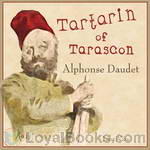 Tartarin of Tarascon
Tartarin of Tarascon
It tells the burlesque adventures of Tartarin, a local hero of Tarascon, a small town in southern France, whose invented adventures and reputation as a swashbuckler finally force him to travel to a very prosaic Algiers in search of lions. Instead of finding a romantic, mysterious Oriental fantasy land, he finds a sordid world suspended between Europe and the Middle East. And worst of all, there are no lions left. | |
 The Immortal Or, One Of The "Forty." (L'immortel) - 1877
The Immortal Or, One Of The "Forty." (L'immortel) - 1877
| |
 Artists' Wives
Artists' Wives
| |
 The Nabob
The Nabob
| |
 Tartarin De Tarascon
Tartarin De Tarascon
| |
 Jack 1877
Jack 1877
| |
 Le Petit Chose (part 1) Histoire d'un Enfant
Le Petit Chose (part 1) Histoire d'un Enfant
| |
 Tartarin On The Alps
Tartarin On The Alps
| |
 The Nabob, Volume 1
The Nabob, Volume 1
| |
 Fromont and Risler
Fromont and Risler
| |
 The Nabob, Vol. 2 (of 2)
The Nabob, Vol. 2 (of 2)
| |
By: George Bernard Shaw (1856-1950) | |
|---|---|
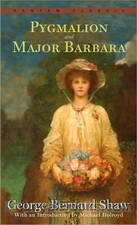 Pygmalion
Pygmalion
If you've watched and loved the delightful musical My Fair Lady, then you'd love to read the wonderful play on which it is based. Pygmalion by George Bernard Shaw is equally engrossing and as full of charm, wit and underlying pathos. First performed on stage in 1912, Pygmalion takes its title from the Greek myth of Pygmalion and Galatea. In the ancient story, a brilliant sculptor, Pygmalion falls in love with one of his own creations, a ravishingly beautiful sculpture whom he names Galatea. He propitiates Aphrodite, who grants his wish that his statue would come to life and that he could marry her... | |
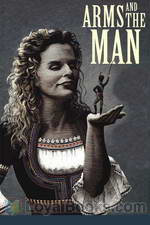 Arms and the Man
Arms and the Man
Arms and the Man is a comedy by George Bernard Shaw that takes place in 1885, during the Serbo-Bulgarian War. Raina Petkoff is engaged to the gallant Sergius Saranoff, hero of the recent Bulgarian victory over the Serbs. But she is distracted by the abrupt arrival of Captain Bluntschli, a Swiss mercenary who fought for the Serbian army. He takes refuge in her bedroom after the battle and although he is initially threatening, reveals that he carries chocolates instead of bullets. Will Raina marry the posturing Sergius or the chocolate cream soldier? Extra intrigue is provided by saucy servant girl Louka, her dour fiance Nicola, and Raina's hand-wringing parents. | |
 The Admirable Bashville
The Admirable Bashville
The Admirable Bashville is a product of the British law of copyright. As that law stands at present, the first person who patches up a stage version of a novel, however worthless and absurd that version may be, and has it read by himself and a few confederates to another confederate who has paid for admission in a hall licensed for theatrical performances, secures the stage rights of that novel, even as against the author himself; and the author must buy him out before he can touch his own work for the purposes of the stage... | |
 Mrs. Warren's Profession
Mrs. Warren's Profession
The story centers on the relationship between Mrs Kitty Warren, a rich woman, described by the author as "on the whole, a genial and fairly presentable old blackguard of a woman" and her daughter, Vivie. Mrs Warren is a middle-aged woman whose Cambridge-educated daughter, Vivie, is horrified to discover the morally questionable way her mother acquired her fortune. | |
 The Doctor's Dilemma
The Doctor's Dilemma
The Doctor's Dilemma is about Dr. Colenso Ridgeon, who has recently been knighted because of a miraculous new treatment he developed for tuberculosis. As his friends arrive to congratulate him on his success, he is visited by two figures who present him with a difficult decision. He has room for one more patient in his clinic; should he give it to Louis Dubedat, a brilliant but absolutely immoral artist, or Dr. Blenkinsop, a poor and rather ordinary physician who is a truly good person? Dr. Ridgeon's dilemma is heightened when he falls for Jennifer Dubedat, the artist's wife, who is innocent of her husband's profligacy. | |
By: Katherine Mansfield (1888-1923) | |
|---|---|
 The Garden Party
The Garden Party
A collection of short stories on a variety of subjects, by one of New Zealand’s best-known writers. | |
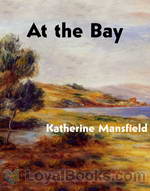 At The Bay
At The Bay
Katherine Mansfield was a prominent Modernist writer of short fiction, and one of New Zealand’s best-known authors. “At the Bay” is a story from her collection The Garden Party. | |
By: Helen Hunt Jackson (1830-1885) | |
|---|---|
 A Calendar of Sonnets
A Calendar of Sonnets
Helen Hunt Jackson is probably most famous for her work on behalf of Native Americans’ rights. However, this short volume presents a sonnet for each month of the year, devoted simply and beautifully to the shifting wonder of nature through the seasons. | |
 Ramona
Ramona
Set in Old California in the wake of the Mexican-American War, Ramona is two stories at once. It is the story of the love between a part-Native American orphan girl, Ramona, and Alessandro, a young Indian sheepherder. It is also the story of racial prejudice and the clash between cultures as California changes from a Spanish colony to an American territory. Ramona is the ward of Señora Gonzaga Moreno, who despises the girl for her race but honors the dying wish of the Señora's sister, Ramona's foster-mother, to raise her as her own... | |
 Letters from a Cat
Letters from a Cat
Letters from a Cat: published by her mistress for the benefit of all cats and the amusement of little children is a collection of letters that a little girl receives from her pet while she is away from home. They tell of her pet’s adventures and misadventures. The book includes a preface which gives a little biography of the cat including its sad demise. H.H. was the alias of Helen Maria Hunt Jackson (1830 –1885) who is better known for her novel Ramona in which she dramatized the mistreatment of Native Americans and which formed part of her campaign for improved treatment of Native Americans by the U.S. Government. | |
 Bits About Home Matters
Bits About Home Matters
This book is a collection of short observations by Helen Hunt Jackson, several with children and parenting as the subject matter. | |
 Between Whiles
Between Whiles
| |
 Mammy Tittleback and Her Family A True Story of Seventeen Cats
Mammy Tittleback and Her Family A True Story of Seventeen Cats
| |
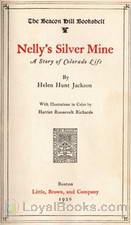 Nelly's Silver Mine A Story of Colorado Life
Nelly's Silver Mine A Story of Colorado Life
| |
 Saxe Holm's Stories
Saxe Holm's Stories
| |
 The Hunter Cats of Connorloa
The Hunter Cats of Connorloa
| |
 Mercy Philbrick's Choice
Mercy Philbrick's Choice
| |
 Hetty's Strange History
Hetty's Strange History
| |
 Hetty's Strange History
Hetty's Strange History
| |
By: Isabella Alden (1841-1930) | |
|---|---|
 Ester Ried
Ester Ried
Authored by Isabella M. Alden under the pen name “Pansy.” Ester Ried’s life is a dull monotony of toiling at her family’s boardinghouse. She’s overworked, jealous and cranky, a poor example of a Christian to her family and associates. She awakens to a new attitude and commitment due to an extended visit with her cousin. | |
 Four Girls at Chautauqua
Four Girls at Chautauqua
Authored by Isabella M. Alden under the pen name “Pansy.” First in the Chautauqua Girls series. Four friends – spoiled, quirky Ruth; fun-loving and mischievous Eurie; poor, independent and brainy Marion; and meek, approval-seeking Flossy – attend Chautauqua on a lark, and their lives are changed forever. (Chautauqua is an adult education movement in the United States, highly popular in the late 19th and early 20th centuries. The Chautauqua brought entertainment and culture for the whole community, with speakers, teachers, musicians, entertainers, preachers and specialists of the day.) | |
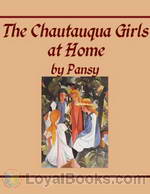 The Chautauqua Girls at Home
The Chautauqua Girls at Home
Sequel to Four Girls at Chautauqua. Ruth, Flossy, Eurie, and Ruth return home as new Christians, eager to begin working. Their new faith clashes with their old lives, which they must overcome, as well as the prejudices of friends and acquaintances. | |
By: Harriet Jacobs (1813-1897) | |
|---|---|
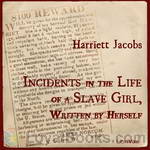 Incidents in the Life of a Slave Girl, Written by Herself
Incidents in the Life of a Slave Girl, Written by Herself
Born in slavery, but being fortunate enough to be owned by a benevolent mistress, her life takes a tragic turn when her parents and her benefactor die. The new heir to the property (and slaves) is a cruel and lewd man who begins to make inappropriate advances to the lovely young slave-girl. In a bid to escape, she becomes entangled in a relationship with a neighboring landowner who promises a better life, and she even has two children. However, things become worse for her when her cruel owner decides to punish her by sending her and her children to a distant cotton plantation to be “broken in... | |
By: W. Somerset Maugham (1874-1965) | |
|---|---|
 The Moon and Sixpence
The Moon and Sixpence
The Moon and Sixpence is a 1919 short novel by William Somerset Maugham based on the life of the painter Paul Gauguin. The story is told in episodic form by the first-person narrator as a series of glimpses into the mind and soul of the central character, Charles Strickland, a middle aged English stock broker who abandons his wife and children abruptly to pursue his desire to become an artist. | |